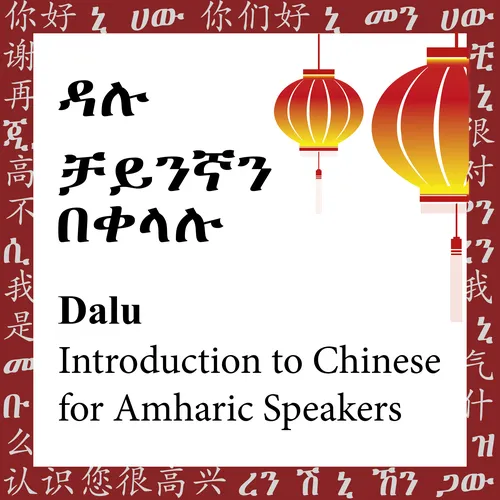
Introduction To Chinese for Amharic Speakers
This is the first course in the world that teaches Amharic speakers introductory Mandarin. Amharic is the official language of Ethiopia, a country with a population of 100 million. This course in Amharic shatters the language barrier and offers cultural contexts unique to these two cultures.
This podcast consists of 50 episodes, split across 25 unique chapters. Each chapter starts with a detailed description of vocabulary and usage in Amharic followed by dialogues between two native Mandarin speakers. You will know exactly how everything is pronounced. It is the best of both worlds!
The book accompanying this podcast can be found on Amazon under "DALU: Introduction to Chinese for Amharic Speakers" by Lina Getachew Ayenew
- Update frequency
- every 6 days
- Average duration
- 7 minutes
- Episodes
- 50
- Years Active
- 2015

Chapter 15a – The Grammar of Time
This chapter explains the correct grammar used in telling time. For example, in Amharic, we can simply say “3 o’clock yesterday.” or “yesterday at 3 o’clock.” But in Chinese, the order in that senten…
![Chapter 14b – Time [Dialogue]](https://b2.eachpod.com/podcast-imgs/99c7817c03a61db7bddf4ba120635407.webp)
Chapter 14b – Time [Dialogue]
These are dialogues that help you practice the various phrases that we have learnt in Chapter 14. As usual, each dialogue is repeated three times to make it easier to remember.

Chapter 14a – Time
This chapter teaches you the basics about time. For example, you will learn how to tell time and the various measures of time such as minutes and hours. In addition, you will also learn about routine…
![Chapter 13b – Shopping [Dialogue]](https://b2.eachpod.com/podcast-imgs/99c7817c03a61db7bddf4ba120635407.webp)
Chapter 13b – Shopping [Dialogue]
These are dialogues that help you practice the various phrases that we have learnt in Chapter 13. As usual, each dialogue is repeated three times to make it easier to remember.

Chapter 13a – Shopping
This chapter teaches you the words you will need to use when you go shopping (e.g. money, price, quality).You will also learn the names of various currencies.
![Chapter 12b – Professions [Dialogue]](https://b2.eachpod.com/podcast-imgs/99c7817c03a61db7bddf4ba120635407.webp)
Chapter 12b – Professions [Dialogue]
These are dialogues that help you practice the various phrases that we have learnt in Chapter 12. As usual, each dialogue is repeated three times to make it easier to remember.

Chapter 12a – Professions
In this chapter, you will learn about the names of various professions. You will also learn words associated with work like “busy” and “tired.”
![Chapter 11b – Family [Dialogue]](https://b2.eachpod.com/podcast-imgs/99c7817c03a61db7bddf4ba120635407.webp)
Chapter 11b – Family [Dialogue]
These are dialogues that help you practice the various phrases that we have learnt in Chapter 11. As usual, each dialogue is repeated three times to make it easier to remember.

Chapter 11a – Family
In this chapter, you will learn how to describe your family and how to talk about how old someone is. Did you know that in Chinese, you can’t just say “sister”? That is because there are different wo…
![Chapter 10b – Order Food #2 [Dialogue]](https://b2.eachpod.com/podcast-imgs/99c7817c03a61db7bddf4ba120635407.webp)
Chapter 10b – Order Food #2 [Dialogue]
These are dialogues that help you practice the various phrases that we have learnt in Chapter 10. As usual, each dialogue is repeated three times to make it easier to remember.

Chapter 10a – Order Food #2
Now you are going to learn how to order food at a restaurant as well as the names of more food items.

Chapter 9 – Measure Words
This chapter teaches you about “measure words.” This concept does not exist in Amharic so it is important to follow along with the book and audio lessons.

Chapter 8 – Ordinal Numbers
This chapter teaches you ordinal numbers in Mandarin Chinese. That is, you will learn how to say “first, second, third, etc.” You will also learn the pattern so that you can construct the ordinal num…

Chapter 7 – Numbers
This chapter explains how to count in Mandarin Chinese. It also teaches you how to recognize patterns in how the numbers are given names.
![Chapter 6b – Ordering Food #1 [Dialogue]](https://b2.eachpod.com/podcast-imgs/99c7817c03a61db7bddf4ba120635407.webp)
Chapter 6b – Ordering Food #1 [Dialogue]
These are dialogues that help you practice the various phrases that we have learnt in Chapter 6. As usual, each dialogue is repeated three times to make it easier to remember.

Chapter 6a – Ordering Food #1
This chapter teaches you what various food items are called in Mandarin Chinese and also explains some words related to food (eating, drinking etc). You will also learn how to say “I am hungry” and a…
![Chapter 5b – Languages [Dialogue]](https://b2.eachpod.com/podcast-imgs/99c7817c03a61db7bddf4ba120635407.webp)
Chapter 5b – Languages [Dialogue]
These are dialogues that help you practice the various phrases that we have learnt in Chapter 5. As usual, each dialogue is repeated three times to make it easier to remember.

Chapter 5a – Languages
This chapter teaches you how to say which languages you can speak, how to ask others what languages they are comfortable with and the names of various languages in Mandarin Chinese.
![Chapter 4b – Nationalities [Dialogue]](https://b2.eachpod.com/podcast-imgs/99c7817c03a61db7bddf4ba120635407.webp)
Chapter 4b – Nationalities [Dialogue]
These are dialogues that help you practice the various phrases that we have learnt in Chapter 4. As usual, each dialogue is repeated three times to make it easier to remember.

Chapter 4a – Nationalities
This chapter teaches you how to say where you are from, how to ask others their country of origin and what various countries are called in Mandarin Chinese.